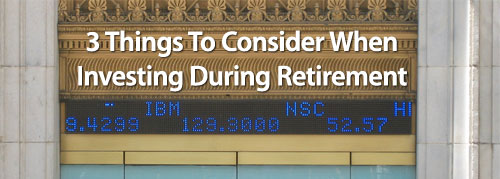Too often, we plan our investments to get us to retirement; we forget that it's a good idea to plan to continue investing through retirement. With life expectancy rising, most of us can expect to be living in retirement for 25, 30, or even 40 years. This means that you can't just put your retirement on automatic, trusting that your portfolio will carry you through without changes. Between inflation, continued fees, and market volatility, it doesn't make sense to assume that the portfolio you have at retirement is the end.
Instead, you need to keep up with your investment planning. While you don't need to become a day trader, there are some things to think about when investing during retirement to make sure that your portfolio survives throughout your golden years:

Quick Navigation
1. Reconsider the 60/40 Stock/Bond Allocation
You don't have to keep sticking with the same old thing, especially since we saw how it can be a real problem with an asset allocation that focuses exclusively on stocks and bonds. Instead, think of how you can add something a little different to your portfolio. The longevity that many of us can expect in retirement means that if you are 55, you can use a 20 or 25 year horizon for part of your portfolio. There are some alternative investments (you can tap into commodities with the help of ETFs), as well as a number of options that, if appropriate to your risk tolerance, can be added to your portfolio.
Don't think that you have to shift everything to bonds as you head toward retirement. While you want to include those types of investments, your retirement is likely to be a long one, and you'll want to keep building assets with a portion of your portfolio during retirement.
2. Diversify Your Income
Retirement is a great time to look for income in diverse places. You can start a side hustle, or turn your hobby into a money maker. Working a little in retirement, if you are doing something you love and that brings in another income stream, can be a great way to invest in your future.
You can also consider a little wider view of “income investing.” Many retirees think of income investments strictly in terms of bonds. However, there are other opportunities. Dividend stocks can provide you with better returns than Treasuries — especially in a low-rate environment. Think about your options, and your risk tolerance. It might be that you can handle the addition of dividend aristocrats in your retirement portfolio as you move forward.
3. Watch Out for Cash
Many retirees like cash because it's safe. After all, you can't lose when your cash is housed in FDIC or FOMC insured financial institutions, right? Unfortunately, this isn't true. Inflation is a big deal, and it's highly unlikely that you will be able to beat inflation with the meager returns you get on cash — especially if your retirement lasts more than 20 years. While having some cash isn't the end of the world, don't switch everything to cash as you retire. Instead, look for other options, and consider that you will need to adjust your asset allocation, and look for new opportunities, throughout your golden years.
I’m nowhere near retirement but I’m hoping when I get there I will have enough to switch to more conservative investments with less risk! Would definitely help me sleep better at night when I get to that point even if I have to same more now to be able to do it later.
Good post Miranda. I deal with this routinely advising my clients as they move into retirement mode. Allocation/diversification are key because inflation even at a 2-3% level erodes purchasing power. I tell anyone who will listen that that the risk of outliving your assets in retirement is far greater than the risk of loss from investing for most people.